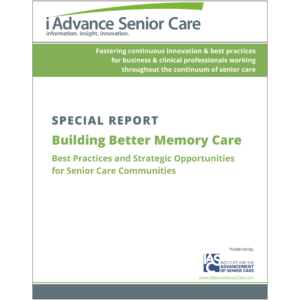Cognitive health subject of new IOM report
Gradual and variable change in mental functions that occurs naturally as people age, not as part of a neurologic disease such as Alzheimer’s, is one of the most challenging health issues encountered by older adults, according to a new report from the Institute of Medicine (IOM). Healthcare professionals must be prepared to provide guidance to older adults and their families, say the authors of the report, “Cognitive Aging: Progress in Understanding and Opportunities for Action.”
“We are only really beginning to understand how the brain changes with age,” said Victor Dzau, MD, president of the IOM. “As the population of older Americans grows, so will the effects of cognitive aging on society. By calling attention to this issue, we can learn more about the risk and protective factors and needed research so older adults can better maintain their cognitive health to the fullest extent possible.”
Based on the findings of the report, healthcare professionals can encourage older adults—and people of all ages—to take these three steps to help promote cognitive health:
- Be physically active.
- Reduce and manage cardiovascular disease risk factors, including high blood pressure, diabetes and smoking.
- Regularly discuss and review health conditions and medications that might influence cognitive health with a healthcare professional. Many medications can have a negative effect—temporary or long-term—on cognitive function when used alone or in combination with other medication.
Other actions that may promote cognitive health, according to the report:
- Be socially and intellectually active, and continually seek opportunities to learn.
- Get adequate sleep and seek professional treatment for sleep disorders, if needed.
- Take steps to avoid a sudden acute decline in cognitive functio (delirium) associated with medications or hospitalizations.
- Carefully evaluate products advertised to consumers to improve cognitive health, such as medications, nutritional supplements and cognitive training.
The report also comments on other factors possibly associated with cognitive health:
- Cognitive stimulation. The authors notes the growing interest in whether cognitive stimulation—either through formal training or everyday activities, such as completing crossword puzzles, participating in a book club, playing card games, or learning to play a musical instrument—can help maintain or enhance cognitive function. The scientific literature shows that older adults can improve on trained abilities and that improvements on the tasks can be maintained over time, but studies examining whether cognitive stimulation and training could transfer to real-world activities and tasks have had mixed results, according to the report. Therefore, the committee said, consumers should carefully consider claims regarding the effectiveness of cognitive aging-related products.
- Vitamins and supplements. Despite widespread publicity about the benefits of vitamins and supplements for brain health, evidence that supplements enhance cognition or prevent decline is limited, and the medical literature does not convincingly support any vitamin supplement intervention to prevent cognitive decline, the report says.
Because older adults with cognitive decline can be at risk for financial abuse, the committee recommends that cognitive aging information resources and tools be developed to help individuals and families.
Related content:
4 steps to protect residents from financial fraud

Lois A. Bowers was senior editor of I Advance Senior Care / Long-Term Living from 2013-2015.
Related Articles
Topics: Alzheimer's/Dementia











